Celestron AstroMaster 102AZ telescope review
The Celestron AstroMaster 102AZ beginner's telescope is as readily suited to observing subjects on land as it is gazing heavenwards. Here's our review
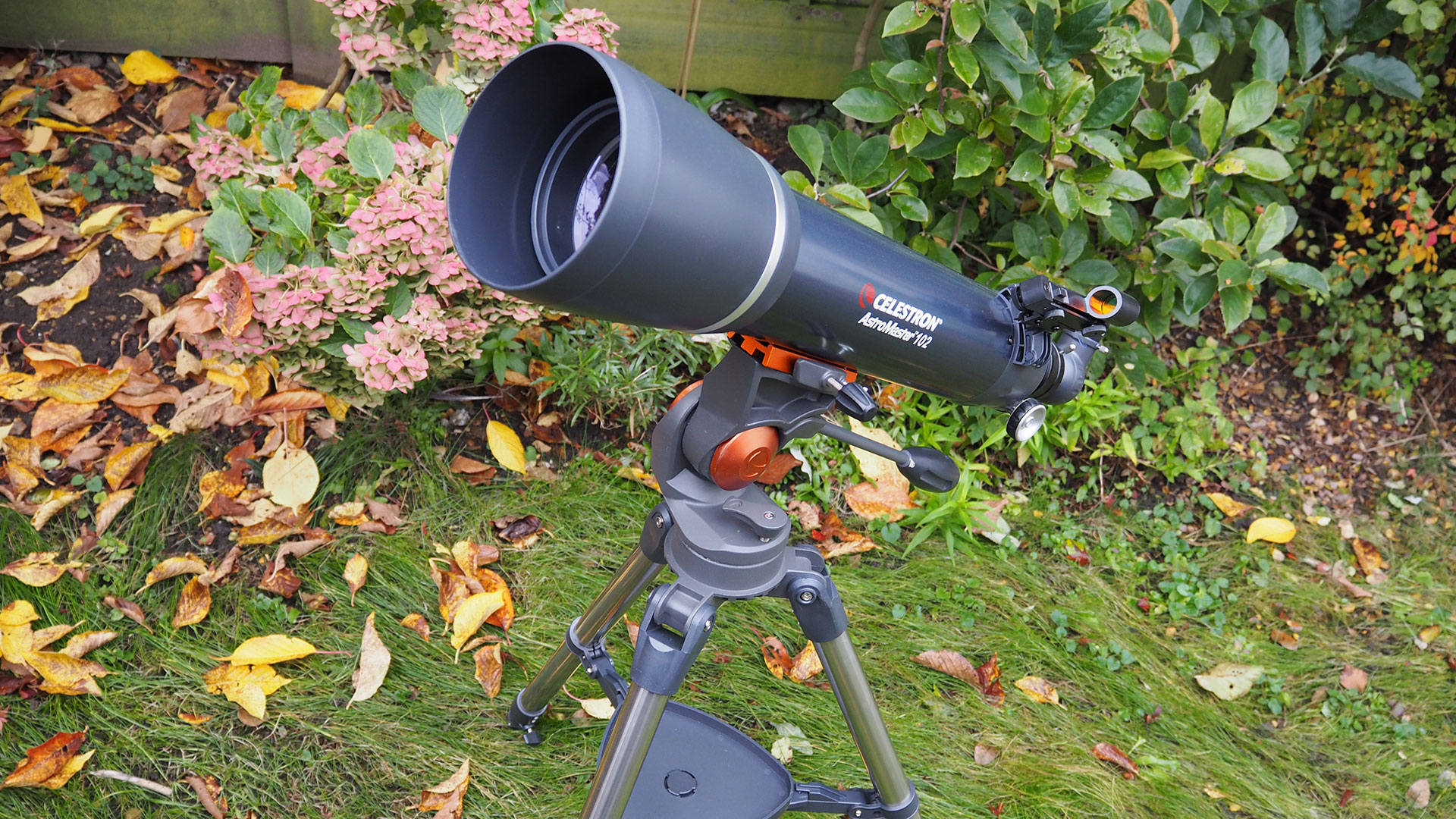

The Celestron AstroMaster 102AZ telescope delivers plenty of beginner-friendly stargazing bang for your buck. The setup resembles the real deal and its viewing possibilities impress. Dig deeper and the build quality is not completely without compromise in terms of stiff parts here and loose parts elsewhere, but put an eye to an eyepiece and all is forgiven.
-
+
Suitable for observation on land as well as stargazing
-
+
Large, bright 102mm objective lens
-
+
Generous 660mm focal length
-
+
Tripod, software and manual included
-
-
Weighs a hefty 6.4Kg
-
-
Focus mechanism is greasy to touch
-
-
Screws on tripod, mounts and eyepieces loosen easily
Why you can trust T3

In this Celestron AstroMaster 102AZ review we'll be looking at this refractor telescope's suitability for the absolute beginner who will be looking for ease of use and versatility, as well as a satisfying performance and of course a value added price. This telescope has been around since 2014, but remains one of the best beginners' telescopes around.
The scope arrives in a huge box nearly 5ft in length – or the height of an average 12-year-old – that would make any amateur astrologer's eyes pop. And who among us hasn't dreamed of becoming an 'AstroMaster' in our younger years? Included out of the box is essentially everything you need to get going, whether looking at subjects on land or up in the sky, which is again another plus – on paper at least – for those looking for a single starter scope that will basically do it all.
If you're brand new to stargazing and not sure what you're looking for, you'll find more advice in our guide to how to choose your first telescope. And when you're ready to move on to something more advanced, check out the best telescopes for stargazing in general. Now let's kick off our in-depth Celestron AstroMaster 102AZ telescope review.
- How to set up a telescope for observing the night sky
Celestron AstroMaster 102AZ telescope review: features
The Celestron AstroMaster 102AZ offers a generous 660mm focal length and, in terms of lining up the scope with whatever we wish to view, what's known as an Altazimuth mount. This is so-termed because it allows movement across two axes: here being up and down plus left and right. Though it is indeed that simple to use, we found the pan handle set up provided to allow heavenly bodies to be located and tracked to be quite stiff in operation, and not as fluid as we might have hoped.
Included in the box is a pair of eyepieces – 10mm, providing for 66x magnification, plus 20mm for 33x magnification – as well as a red dot finder scope for pinpointing subjects more accurately. Initially this accessory device appeared to be a different one to that shown in the manual; in fact an addendum sheet is provided in the box for the new version. We also get Starry Night astronomy software, supplied in the physical format of an actual CD for those who still have a CD drive in the computer of their choice – otherwise there is a more practical Android or iOS app.
Clipped into the space between the legs of the provided tripod when setting everything up is also an accessory tray. Though by no means essential, this acts as a useful place to store whichever of the two eyepieces is not currently the one being used, and avoid mislaying the scope's lens and eyepiece caps.
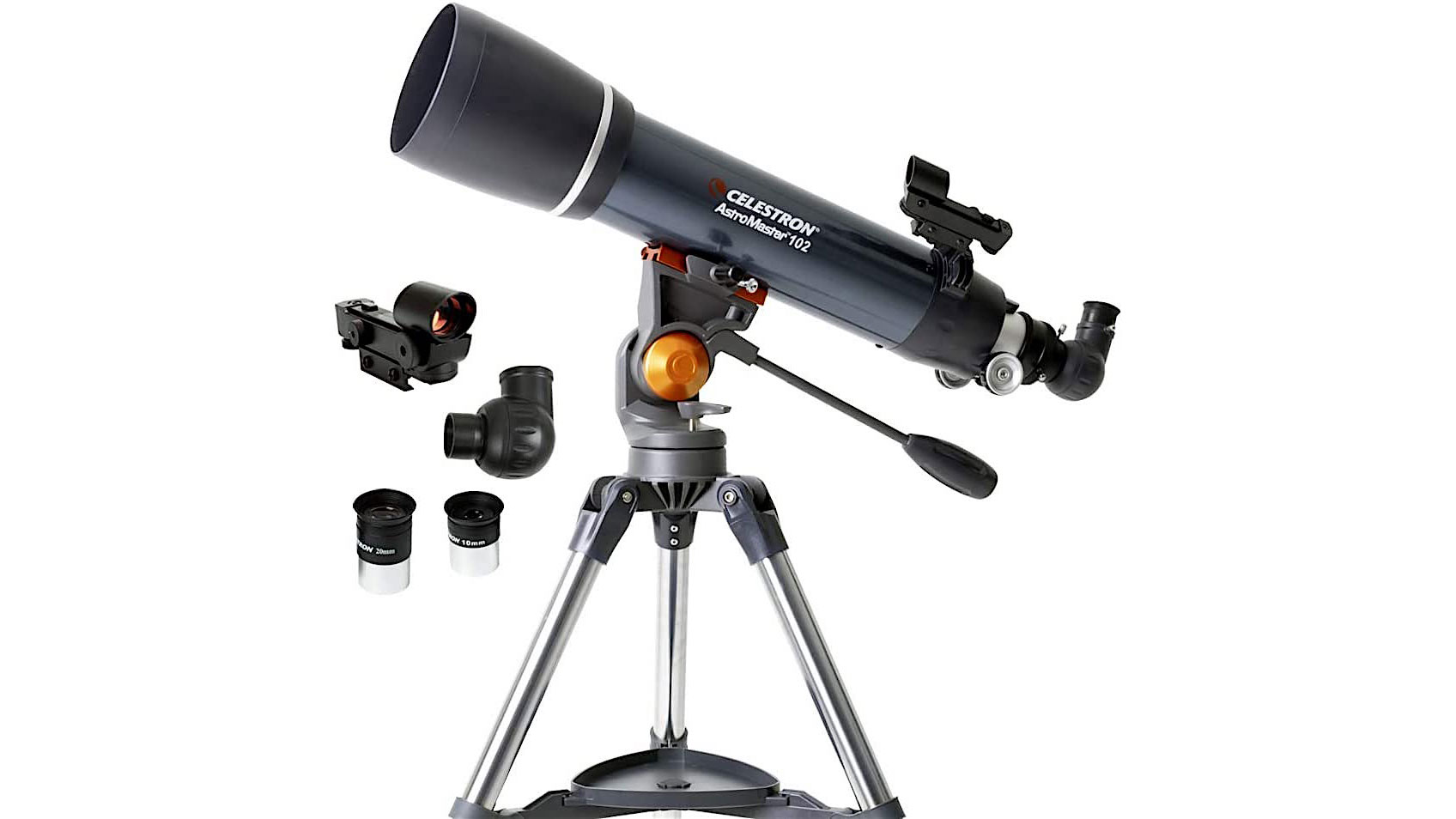
Celestron AstroMaster 102AZ review: setup
Adding to the heft and overall footprint of this telescope is the fact that the package includes a full height steel tripod onto which the scope is slotted into place, with two screws tightened to prevent it from sliding about in its mount. While this adds stability it also adds weight when compared to the alternative of an aluminium or (even better) carbon fibre tripod, which would make for a lightweight alternative, but inevitably push up the price. In fairness, if you're a beginner, you don't want to be paying a premium price, so this is a compromise that feels wearable.
Get all the latest news, reviews, deals and buying guides on gorgeous tech, home and active products from the T3 experts
The fact that this is a keenly priced model does however mean that some components feel a little stiff and less fluid in operation than we'd like – the pan and tilt handle for instance. But, to take a positive view, at least this stiffness does prevent the view through the telescope accidentally slipping or being inadvertently jogged as we've an eye flush to the eyepiece.
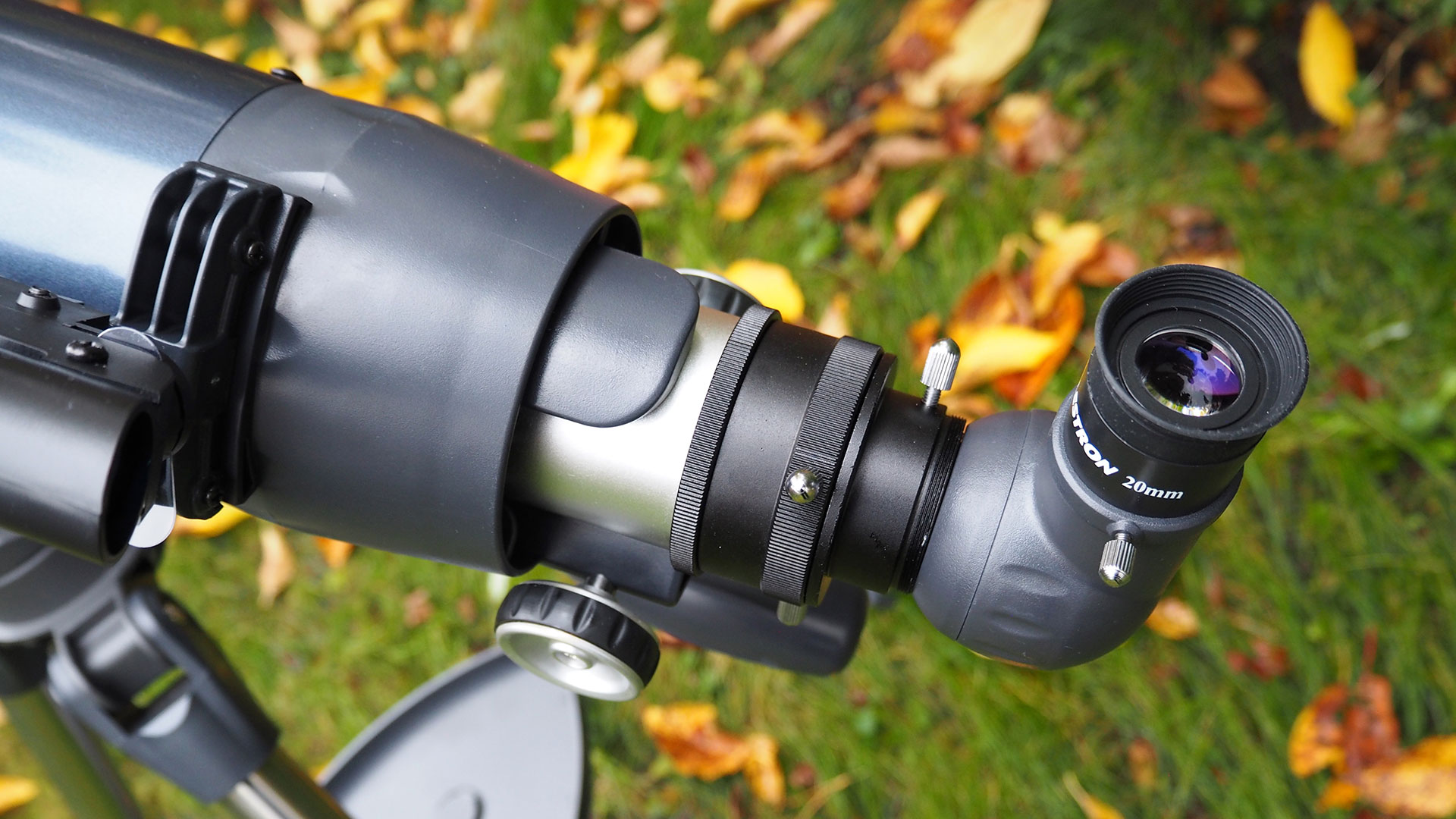
Set up time is minimal, and apart from a standard Phillips screwdriver – not included – being required for loosening the screws on the StarPoint Finderscope, so it can be slid onto the bracket provided on the telescope itself, no special tools are required. Leg heights are adjusted by loosening or tightening provided screws on each leg, while the barrel is held in place on the tripod mount by tightening a pair of screws by hand. With minimal tools and instructions provided, if IKEA was to add telescopes to stock, we believe they'd be something like the Celestron AstroMaster 102AW.
Celestron AstroMaster 102AZ telescope review: handling & operation
One word of warning; since the screws to adjust the tripod height and positioning of the telescope on its mount are, along with the eyepiece fitting, hand adjusted, it's possible for these self-same screws and fittings to gradually, in the course of handling the tripod, work themselves a little loose.
So if you're going to leave the tripod set up, rather than dismantling it between uses, it's worth doing a quick check to make sure all the key fixable elements are screwed nice and tightly in place before operating. Otherwise we can witness a scenario in which the telescope barrel gingerly slides loose from its mount as we tilt the scope itself ever skywards, or the eyepiece starts to rattle after we've pressed an eyeball intently up to it. All very easily solved and nothing that's a deal breaker, but perhaps a slight betrayal of the type of plastic and metal fittings required to bring a telescope of this type to market at a beginner-friendly price.
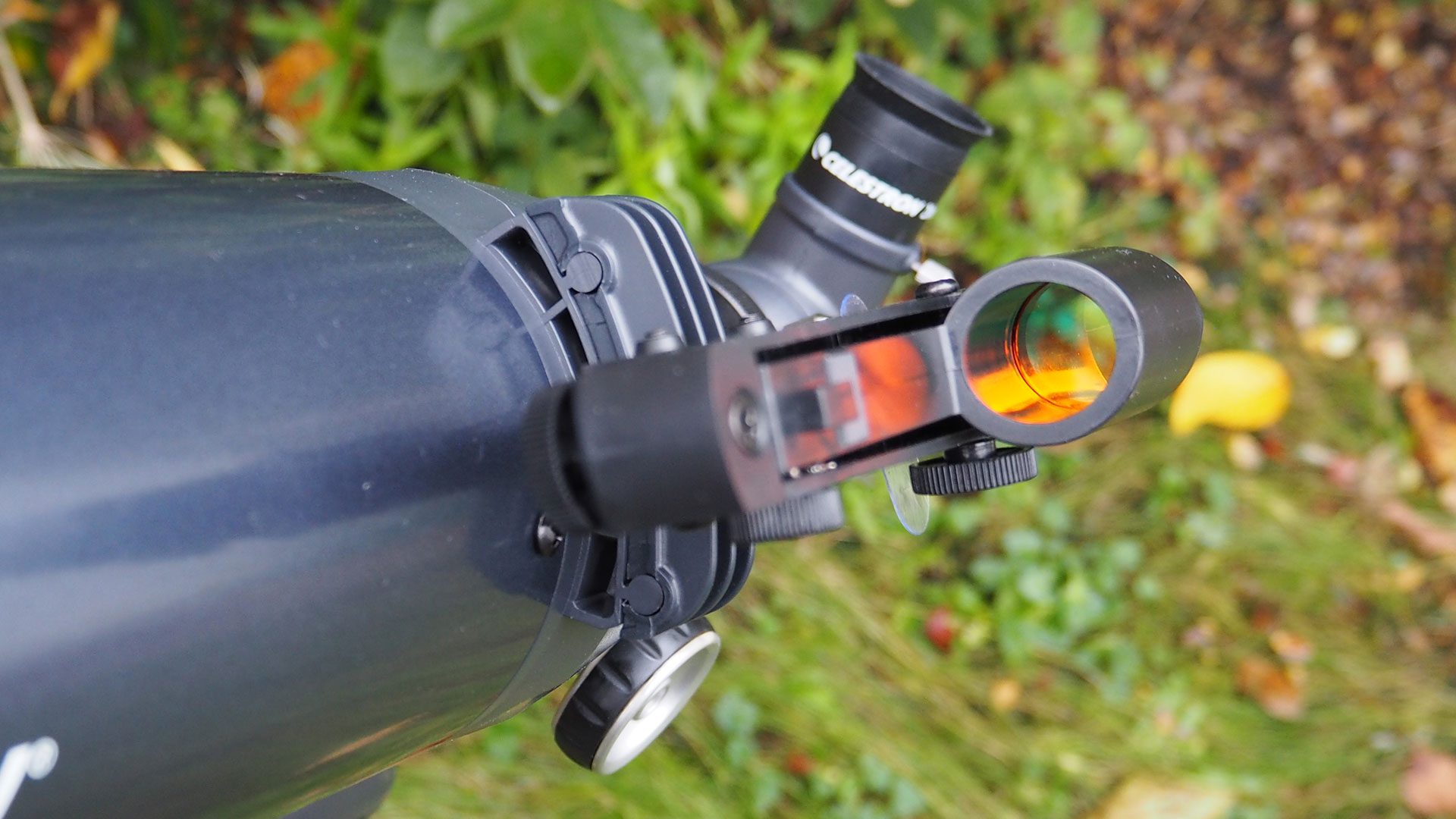
For detailed, ultra bright views of the Moon, this one is the business, but if we're wanting to reach out into deep space, a higher specified option still would be our preference. The first few times we adjusted the telescope's focus knobs also resulted in fingertips getting sticky with the grease obviously used to oil the sliding focus mechanism. We can imagine this putting off the very youngest members of the family from repeated use, which would be unfortunate as the view through the eyepiece and lens is impressively sharp. Though if we're being picky, during daytime use we did notice occasional purple fringing between areas of high contrast – the dark edge of a building set against a featureless sky, for example.
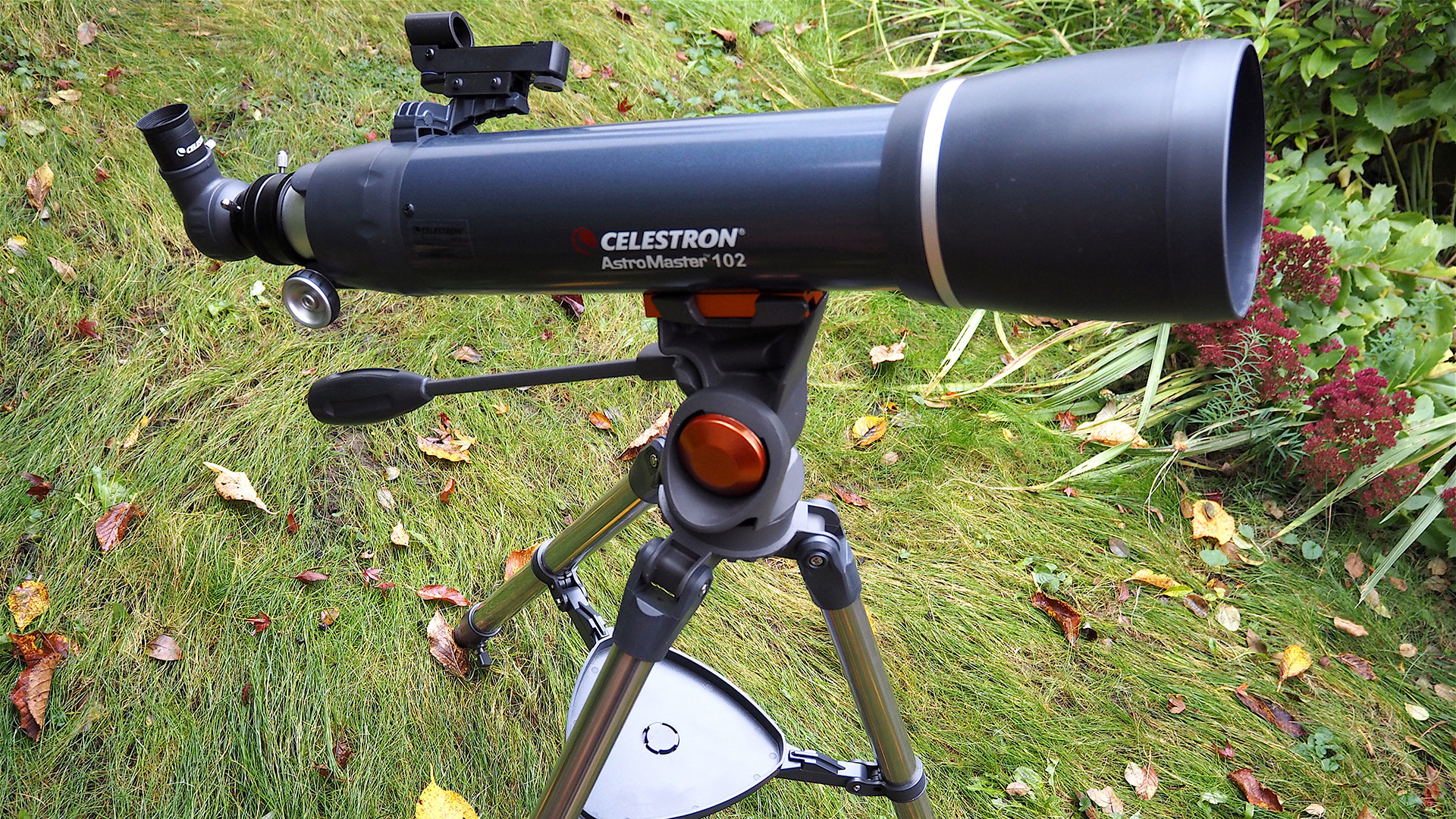
Unlike with say, a pair of high magnification binoculars, whereby any hand wobble is magnified and it's difficult to achieve a judder free view unless using a tripod or any built-in for of image stabilization, here the chunky steel tripod provided makes for rock-solid images and wobble free viewing. In fact so engrossed in our subject matter it's easy to become that the device we're using melts away and we can almost believe we're looking at far away objects with our own eyes. That probably is the greatest appeal of, and compliment to, the Celestron AstroMaster 102AZ.
Celestron AstroMaster 102AZ review: alternatives to consider
Inevitably for those seeking a beginner-friendly scope, there are a few alternatives to Celestron's AstroMaster. The offers the benefit of a longer focal length, a more generous 56x magnification via its standard 25mm eyepiece and a more than generous 140x magnification via its 10mm eyepiece. The result is that unlike most starter scopes that are good for viewing the Moon and not a whole lot else, the Orion purports to allow us to bring the viewing of various nebulae and star clusters into the mix. As long as, of course, we have a clear bright night free of cloud and artificial light pollution. It's also provided with an upgraded Equatorial mount – which compensates for the Earth's rotation – rather than the Altazimuth mount of earlier generations.
Alternatively, we may want for something less cumbersome and heavy than the offering we're reviewing here, but just as user friendly and approachable. That's a wish granted by the Celestron Travel Scope 70, which comes with its own backpack provided. Yes we get a portably lightweight frame, weighing a total of 1.6kg as opposed to a weight exceeding 6kg for the scope reviewed here, but also a decrease in focal length too – here a lesser 400mm – so there is inevitably some compromise to be made. Which means that if we intend to mostly stay put when using the telescope, then Celestron's own AstroMaster 102AZ may still be the better bet.
Celestron AstroMaster 102AZ review: verdict
With a relatively easy and quick set up required, the Celestron AstroMaster 102AZ telescope and tripod combo looks the part, and the construction of the main components feels sturdy. It's only the fact that its hand-adjustable screws can work themselves loose with regular handling, and grease from its focus mechanism gets onto fingertips which betrays the fact that this setup has been engineered to meet a certain beginner friendly price point.
Both reassuringly, yet disconcertingly for those of us living in smaller spaces, the chunky set up has quite a large footprint and would certainly suit those with larger homes and gardens that they're able to get out into for a clearer view of the night sky – or at least those of us with a spare room, or corner of a spare room to set aside for its semi-permanent use and storage. A good choice for beginners, but inevitably not a 100% perfect one.
First reviewed November 2021.

Gavin Stoker has been writing about photography and technology for the past 20 years. He currently edits the trade magazine British Photographic Industry News - BPI News for short - which is a member of TIPA, the international Technical Imaging Press Association.